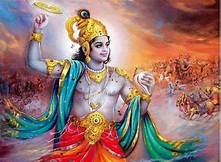|
Who is Demonic Person - The Shrimad Bhagavad Gita ॥ श्रीमद्भगवद्गीता ॥ ॥ ॐ श्री परमात्मने नमः ॥ ॥ अथ श्रीमद्भगवद्गीता ॥ Shree Krishna has explained in chapters 14, 16 17 and 18 of Shrimad Bhagavad Gita about the different personalities of persons which are caused by the root material i.e. Prakriti (nature) having three attributes viz. Sattva, Rajas and Tamas in varying proportion. The different characteristics viz. state of mind, actions & doership, charity, spiritual duties, food habits, true knowledge, intellect, determination, joy and re-birth spell out about the tamsika person. Tamasika person is characterised by inertia (lethargy, inactivity), darkness, dullness, ignorance, madness, intoxication, lassitude, atheism, addiction to women, drowsiness, sloth, worthlessness, impurity and the like. Tamas element covers the knowledge and impels one to madness (14.9). By overpowering Sattva and Rajas, Tamas prevails (14.10). Ignorance is the fruit of a Tamasika act (14.16). The Tamas , the deceiver of all those who look upon the body as their own self, as born of ignorance. It binds the soul through carelessness/madness, laziness and sleep (14.8). Hypocrisy, arrogance, prides and anger, harshness and ignorance, these are the marks of him, who is born with demoniac properties. Knowledge dominated by tamas sees side issues as the whole truth and doggedly holds on to them without due thought, under the prompting of passions; actions dominated by it is undertaken thoughtlessly without estimate of one’s capacity of resources, and is prompted by delusions and cruel motives; the agent dominated by tamas is fickle minded, insolent, exploiting, procrastinating and slipshod in his methods; the intelligence is dominated by it sees unrighteousness as righteousness and takes the wrong side of everything; strength of mind or determination dominated by it is always subject to depression, vacillation, and overbearing insolence; and pleasure dominated by it is from the beginning to the end riddled delusion, lethargy and heedlessness. The main attributes of Demonic Person are listed as under (in bracket, chapter.verse) (the relevant Sanskrit verses of Bhagavad Gita are mentioned at the bottom):
Reference:
Chapter: 14 तमस्त्वज्ञानजं विद्धि मोहनं सर्वदेहिनाम् । प्रमादालस्यनिद्राभिस्तन्निबध्नाति भारत ॥ १४-८॥ सत्त्वं सुखे सञ्जयति रजः कर्मणि भारत । ज्ञानमावृत्य तु तमः प्रमादे सञ्जयत्युत ॥ १४-९॥ रजस्तमश्चाभिभूय सत्त्वं भवति भारत । रजः सत्त्वं तमश्चैव तमः सत्त्वं रजस्तथा ॥ १४-१०॥ अप्रकाशोऽप्रवृत्तिश्च प्रमादो मोह एव च । तमस्येतानि जायन्ते विवृद्धे कुरुनन्दन ॥ १४-१३॥ रजसि प्रलयं गत्वा कर्मसङ्गिषु जायते । तथा प्रलीनस्तमसि मूढयोनिषु जायते ॥ १४-१५॥ कर्मणः सुकृतस्याहुः सात्त्विकं निर्मलं फलम् । रजसस्तु फलं दुःखमज्ञानं तमसः फलम् ॥ १४-१६॥ Chapter: 16 प्रवृत्तिं च निवृत्तिं च जना न विदुरासुराः । न शौचं नापि चाचारो न सत्यं तेषु विद्यते ॥ १६-७॥ असत्यमप्रतिष्ठं ते जगदाहुरनीश्वरम् । अपरस्परसम्भूतं किमन्यत्कामहैतुकम् ॥ १६-८॥ एतां दृष्टिमवष्टभ्य नष्टात्मानोऽल्पबुद्धयः । प्रभवन्त्युग्रकर्माणः क्षयाय जगतोऽहिताः ॥ १६-९॥ काममाश्रित्य दुष्पूरं दम्भमानमदान्विताः । मोहाद्गृहीत्वासद्ग्राहान्प्रवर्तन्तेऽशुचिव्रताः ॥ १६-१०॥ चिन्तामपरिमेयां च प्रलयान्तामुपाश्रिताः । कामोपभोगपरमा एतावदिति निश्चिताः ॥ १६-११॥ आशापाशशतैर्बद्धाः कामक्रोधपरायणाः । ईहन्ते कामभोगार्थमन्यायेनार्थसञ्चयान् ॥ १६-१२॥ इदमद्य मया लब्धमिमं प्राप्स्ये मनोरथम् । इदमस्तीदमपि मे भविष्यति पुनर्धनम् ॥ १६-१३॥ असौ मया हतः शत्रुर्हनिष्ये चापरानपि । ईश्वरोऽहमहं भोगी सिद्धोऽहं बलवान्सुखी ॥ १६-१४॥ आढ्योऽभिजनवानस्मि कोऽन्योऽस्ति सदृशो मया । यक्ष्ये दास्यामि मोदिष्य इत्यज्ञानविमोहिताः ॥ १६-१५॥ अनेकचित्तविभ्रान्ता मोहजालसमावृताः । प्रसक्ताः कामभोगेषु पतन्ति नरकेऽशुचौ ॥ १६-१६॥ आत्मसम्भाविताः स्तब्धा धनमानमदान्विताः । यजन्ते नामयज्ञैस्ते दम्भेनाविधिपूर्वकम् ॥ १६-१७॥ अहङ्कारं बलं दर्पं कामं क्रोधं च संश्रिताः । मामात्मपरदेहेषु प्रद्विषन्तोऽभ्यसूयकाः ॥ १६-१८॥ तानहं द्विषतः क्रूरान्संसारेषु नराधमान् । क्षिपाम्यजस्रमशुभानासुरीष्वेव योनिषु ॥ १६-१९॥ आसुरीं योनिमापन्ना मूढा जन्मनि जन्मनि । मामप्राप्यैव कौन्तेय ततो यान्त्यधमां गतिम् ॥ १६-२०॥ Chapter: 17 अशास्त्रविहितं घोरं तप्यन्ते ये तपो जनाः । दम्भाहङ्कारसंयुक्ताः कामरागबलान्विताः ॥ १७-५॥ कर्षयन्तः शरीरस्थं भूतग्राममचेतसः । मां चैवान्तःशरीरस्थं तान्विद्ध्यासुरनिश्चयान् ॥ १७-६॥ यातयामं गतरसं पूति पर्युषितं च यत् । उच्छिष्टमपि चामेध्यं भोजनं तामसप्रियम् ॥ १७-१०॥ विधिहीनमसृष्टान्नं मन्त्रहीनमदक्षिणम् । श्रद्धाविरहितं यज्ञं तामसं परिचक्षते ॥ १७-१३॥ मूढग्राहेणात्मनो यत्पीडया क्रियते तपः । परस्योत्सादनार्थं वा तत्तामसमुदाहृतम् ॥ १७-१९॥ अदेशकाले यद्दानमपात्रेभ्यश्च दीयते । असत्कृतमवज्ञातं तत्तामसमुदाहृतम् ॥ १७-२२॥ ) Chapter: 18 यत्तु कृत्स्नवदेकस्मिन्कार्ये सक्तमहैतुकम् । अतत्त्वार्थवदल्पं च तत्तामसमुदाहृतम् ॥ १८-२२॥ अनुबन्धं क्षयं हिंसामनपेक्ष्य च पौरुषम् । मोहादारभ्यते कर्म यत्तत्तामसमुच्यते ॥ १८-२५॥ अयुक्तः प्राकृतः स्तब्धः शठो नैष्कृतिकोऽलसः । विषादी दीर्घसूत्री च कर्ता तामस उच्यते ॥ १८-२८॥ अधर्मं धर्ममिति या मन्यते तमसावृता । सर्वार्थान्विपरीतांश्च बुद्धिः सा पार्थ तामसी ॥ १८-३२॥ यया स्वप्नं भयं शोकं विषादं मदमेव च । न विमुञ्चति दुर्मेधा धृतिः सा पार्थ तामसी ॥ १८-३५॥ यदग्रे चानुबन्धे च सुखं मोहनमात्मनः । निद्रालस्यप्रमादोत्थं तत्तामसमुदाहृतम् ॥ १८-३९॥
0 Comments
Leave a Reply. |

 RSS Feed
RSS Feed